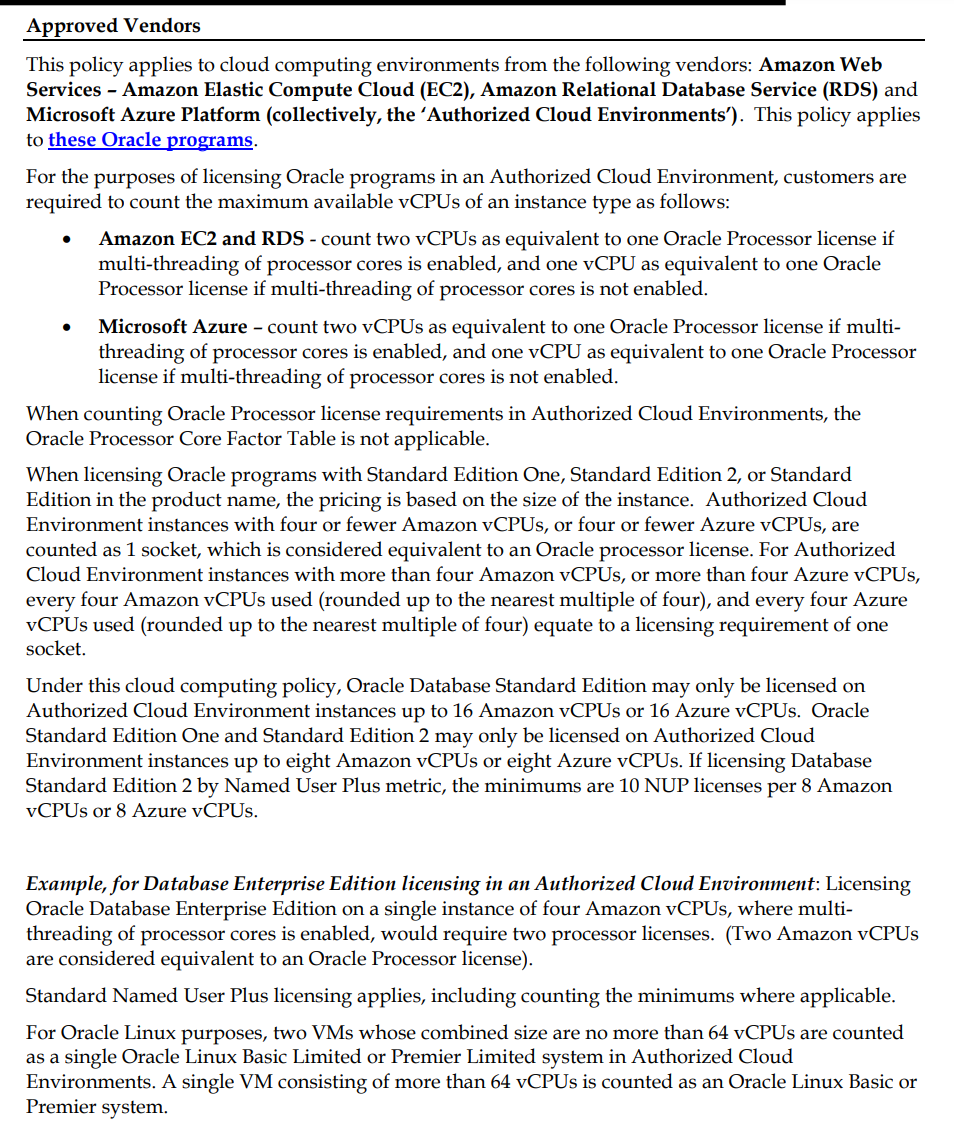When you think you know nearly everything about licences, then you get stumped again... Here is one that I've forgotten. This is, in my opinion, a great reason to not use an oracle database on premise. Oracle are not modernising their licence requirements for their database product on premise, and have seemingly leapfrogged virtual technologies and gone on to support Azure and AWS a little bit better. (Though what about google and other public clouds - beware!)
Reading this oracle document oracle-software-licensing-basics and subsequently this one on partitioning partitioning-070609.pdf you cannot run oracle DB on any virtual server. With some exceptions for hardware partitioning, nothing decent listed. Ouch.
At a point in time, I thought that this also means the cloud - which honestly cannot be correct. The fact is that you can BYOL oracle licences to AWS RDS or have them included in the RDS instance and you are not paying for ALL of the cores of the MONSTER backend machine in AWS.
Unless explicitly stated elsewhere in this document, soft partitioning (including features/functionality of any technologies listed as examples above) is not permitted as a means to determine or limit the number of software licenses required for any given server or cluster of servers.
And for future deployments, how about this : that host or Kubernetes node must be licensed for the Oracle Programs for the number of processors on that host or Kubernetes node. I
So there is a large discrepancy here... Then I found what I was looking for: cloud-licensing-070579.pdf
There are exceptions for AWS and Azure - how about that or oracle love!
Amazon EC2 and RDS - count two vCPUs as equivalent to one Oracle Processor license if multi-threading of processor cores is enabled, and one vCPU as equivalent to one Oracle Processor license if multi-threading of processor cores is not enabled.
Microsoft Azure – count two vCPUs as equivalent to one Oracle Processor license if multithreading of processor cores is enabled, and one vCPU as equivalent to one Oracle Processor license if multi-threading of processor cores is not enabled.
This is important too:
Under this cloud computing policy, Oracle Database Standard Edition may only be licensed on Authorized Cloud Environment instances up to 16 Amazon vCPUs or 16 Azure vCPUs. Oracle Standard Edition One and Standard Edition 2 may only be licensed on Authorized Cloud Environment instances up to eight Amazon vCPUs or eight Azure vCPUs. If licensing Database Standard Edition 2 by Named User Plus metric, the minimums are 10 NUP licenses per 8 Amazon vCPUs or 8 Azure vCPUs
Therefore, oracle technology foundation oracle-technology-foundation-487257.pdf
JD Edwards EnterpriseOne customers have long realized the benefits of implementing JD Edwards EnterpriseOne on the industry-leading Oracle Database. Oracle Technology Foundation provides JD Edwards EnterpriseOne customers with the features and functions equivalent to Oracle Database Standard Edition for use within their JD Edwards EnterpriseOne implementation.
So, I think that I have done the due diligence for you. Oracle technology foundation gives you the ability to use oracle standard edition, the oracle cloud compute policy allows you to have up to 16 Amazon or Azure vCPUs on a host running the database. Therefore it seems that you can BYOL for RDS for SE up to 16 cores and also stand up EC2 with 16 cores the same. That is a BIG machine for running JDE.



No comments:
Post a Comment